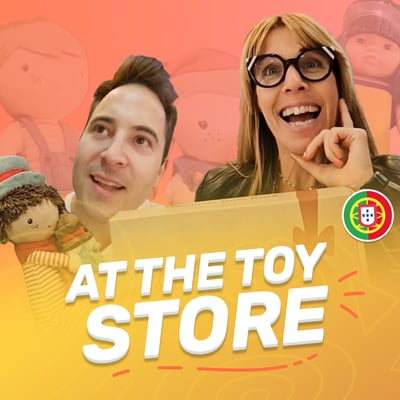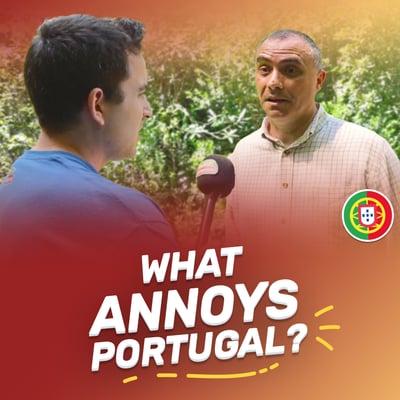1
00:00:01,050 –> 00:00:05,480
Joel: Vamos ver o que está a acontecer agora no nosso escritório.
{{Joel: Let’s see what’s happening now in our office.}}
2
00:00:05,480 –> 00:00:07,500
Rui: No nosso escritório.
{{Rui: In our office.}}
3
00:00:07,500 –> 00:00:09,350
Joel: Eu disse “no nosso escritório”.
{{Joel: I said “in our office”.}}
4
00:00:09,350 –> 00:00:11,740
Rui: Tu disseste ‘no nôsso’.
{{Rui: You said ‘no nôsso’.}}
5
00:00:11,740 –> 00:00:14,000
Joel: Tu estás a trabalhar muito, Rui?
{{Joel: Are you working hard, Rui?}}
6
00:00:14,000 –> 00:00:18,120
Rui: Estou a fazer café, porque toda a gente precisa de café para trabalhar.
{{Rui: I’m making coffee, because everyone needs coffee to work.}}
7
00:00:18,120 –> 00:00:20,450
Joel: Estilo português, estilo à português, não é?
{{Joel: Portuguese style, Portuguese style, isn’t it?}}
8
00:00:20,450 –> 00:00:23,320
Rui: Quer dizer, eu não estou a fazer. Quem fez foi a Damiana.
{{Rui: I mean, I’m not making it. Damiana made it.}}
9
00:00:23,320 –> 00:00:25,610
Eu estou a terminar. Damiana, queres um café?
{{I’m finishing. Damiana, would you like a coffee?}}
10
00:00:25,610 –> 00:00:27,720
Damiana: Pode ser.
{{Damiana: Sure.}}
11
00:00:27,720 –> 00:00:29,350
Rui: Usas açúcar?
{{Rui: Do you use sugar?}}
12
00:00:29,350 –> 00:00:31,910
Damiana: Não, sempre sem açúcar.
{{Damiana: No, always without sugar.}}
13
00:00:31,910 –> 00:00:33,360
Joel: Muito saudável.
{{Joel: Very healthy.}}
14
00:00:33,360 –> 00:00:38,510
Rui: Eu confesso que não consigo beber o café sem açúcar.
{{Rui: I confess I can’t drink the coffee without sugar.}}
15
00:00:38,510 –> 00:00:39,470
Joel: Oh, pequenino.
{{Joel: Oh, little one.}}
16
00:00:39,470 –> 00:00:46,210
Rui: Sim, mas é a única coisa em que eu uso açúcar.
{{Rui: Yes, but it’s the only thing I use sugar on.}}
17
00:00:46,210 –> 00:00:48,850
Joel: Olha, [o] nosso logótipo não está aceso.
{{Joel: Look, our logo isn’t lit.}}
18
00:00:48,850 –> 00:00:52,710
Rui: E tu usas com açúcar, Joel?
{{Rui: And you take it with sugar, Joel?}}
19
00:00:52,710 –> 00:00:54,200
Joel: [Às] vezes sim.
{{Joel: Sometimes yes.}}
20
00:00:54,200 –> 00:00:55,220
Rui: Às vezes.
{{Rui: Sometimes.}}
21
00:00:55,220 –> 00:00:56,680
Joel: Outras vezes não.
{{Joel: Sometimes not.}}
22
00:00:56,680 –> 00:00:58,860
Rui: Diz “às vezes”.
{{Rui: Say ‘às vezes’.}}
23
00:00:58,860 –> 00:00:59,570
Joel: [Às] vezes.
{{Joel: Sometimes.}}
24
00:00:59,570 –> 00:01:00,470
Rui: Às.
{{Rui: Às.}}
25
00:01:00,470 –> 00:01:02,490
Joel: Às… as… às vezes.
{{Joel: Às… as… às vezes.}}
26
00:01:02,490 –> 00:01:03,620
Rui: Às vezes.
{{Rui: Sometimes.}}
27
00:01:03,620 –> 00:01:06,590
Joel: Digo sempre ‘as vezes’. Às vezes.
{{Joel: I always say ‘as vezes’. Sometimes.}}
28
00:01:06,590 –> 00:01:09,500
Rui: Às vezes.
{{Rui: Sometimes.}}
29
00:01:09,500 –> 00:01:14,420
Joel: Aprendemos sempre alguma coisa aqui na sede [do] Practice Portuguese.
{{Joel: We always learn something here at Practice Portuguese headquarters.}}
30
00:01:14,420 –> 00:01:15,530
No sede ou na sede?
{{At the headquarters (masc.) or at the headquarters (fem.)?}}
31
00:01:15,530 –> 00:01:15,810
Damiana: Na sede.
{{Damiana: At the headquarters.}}
32
00:01:15,810 –> 00:01:17,680
Joel: Na sede.
{{Joel: At the headquarters.}}
33
00:01:17,680 –> 00:01:18,260
Damiana: Feminino.
{{Damiana: Feminine.}}
34
00:01:18,260 –> 00:01:21,100
Joel: Muito bem. Então, Damiana, o que é que tu estás a fazer?
{{Joel: Very well. So, Damiana, what are you doing?}}
35
00:01:21,100 –> 00:01:25,890
Damiana: Olha, hoje estou a editar um próximo vídeo.
{{Damiana: Look, today I’m editing an upcoming video.}}
36
00:01:25,890 –> 00:01:27,620
Joel: É sobre o quê?
{{Joel: What’s it about?}}
37
00:01:27,620 –> 00:01:33,790
Damiana: Cuidado, não podes mostrar, é secreto. É secreto.
{{Damiana: Be careful, you can’t show it, it’s secret. It’s secret.}}
38
00:01:33,790 –> 00:01:37,660
Rui: Damiana, tens uns óculos muito giros!
{{Rui: Damiana, you have very nice glasses!}}
39
00:01:37,660 –> 00:01:39,580
Damiana: São novos.
{{Damiana: They’re new.}}
40
00:01:39,580 –> 00:01:40,580
Joel: Lindos.
{{Joel: Beautiful.}}
41
00:01:40,580 –> 00:01:41,910
Damiana: Obrigada.
{{Damiana: Thank you.}}
42
00:01:41,910 –> 00:01:43,560
Joel: E como se chama isso?
{{Joel: And what’s that called?}}
43
00:01:43,560 –> 00:01:44,570
Damiana: É o rato.
{{Damiana: It’s the mouse.}}
44
00:01:44,570 –> 00:01:45,200
Joel: É de que cor?
{{Joel: What colour is it?}}
45
00:01:45,200 –> 00:01:46,300
Damiana: É cor-de-rosa.
{{Damiana: It’s pink.}}
46
00:01:46,300 –> 00:01:47,460
Joel: Porquê?
{{Joel: Why?}}
47
00:01:47,460 –> 00:01:49,530
Damiana: Porque é a minha cor preferida.
{{Damiana: Because it’s my favourite colour.}}
48
00:01:49,530 –> 00:01:50,350
Joel: Ah, OK.
{{Joel: Ah, OK.}}
49
00:01:50,350 –> 00:01:53,490
Damiana: Mas é muito bonito e é suave, é aerodinâmico.
{{Damiana: But it’s very pretty and it’s smooth, it’s aerodynamic.}}
50
00:01:53,490 –> 00:01:56,050
Joel: É, mas eu sou um homem de trackpad.
{{Joel: It is, but I’m a trackpad man.}}
51
00:01:56,050 –> 00:01:58,900
Não há palavra para isso em português, pois não?
{{There’s no word for it in Portuguese, is there?}}
52
00:01:58,900 –> 00:02:03,840
Rui: Qual é o contrário de suave em português? Vamos ver o que é que tu dirias.
{{Rui: What’s the opposite of smooth in Portuguese? Let’s see what you’d say.}}
53
00:02:03,840 –> 00:02:13,380
Joel: Suave ou… Rough. Espera.
{{Joel: Smooth or… Rough. Wait.}}
54
00:02:13,380 –> 00:02:17,090
Damiana: Tu consegues.
{{Damiana: You can do it.}}
55
00:02:17,090 –> 00:02:18,600
Joel: Começa por qual letra?
{{Joel: Which letter does it start with?}}
56
00:02:18,600 –> 00:02:21,800
Damiana: Assim estamos a ajudar.
{{Damiana: That way we’re helping.}}
57
00:02:21,800 –> 00:02:26,760
Rui: Eu também não sei se o que eu diria é o correto.
{{Rui: I don’t know if what I’d say is correct either.}}
58
00:02:26,760 –> 00:02:28,680
Damiana: Qual é a palavra que tu dirias?
{{Damiana: Which word would you say?}}
59
00:02:28,680 –> 00:02:30,100
Rui: Começa com um R.
{{Rui: It starts with an R.}}
60
00:02:30,100 –> 00:02:34,500
Joel: Hey, Siri, how do you say rough in Portuguese? Áspero.
{{Joel: Hey, Siri, how do you say rough in Portuguese? Rough.}}
61
00:02:34,500 –> 00:02:35,500
Rui: Áspero.
{{Rui: Rough.}}
62
00:02:35,500 –> 00:02:38,820
Joel: É? Não é brasileiro? Nunca ouvi áspero.
{{Joel: Yeah? Isn’t it Brazilian? I’ve never heard rough.}}
63
00:02:38,820 –> 00:02:41,650
Damiana: A palavra que estavas a pensar é rugoso.
{{Damiana: The word you were thinking of is rough (bumpy/uneven/rugged).}}
64
00:02:41,650 –> 00:02:43,100
Rui: Era. Mas áspero faz mais sentido.
{{Rui: It was. But rough (to the touch, coarse/scratchy) makes more sense.}}
65
00:02:43,100 –> 00:02:46,460
Joel: Também não sabia, como é que eu passei… Quantos anos?
{{Joel: I didn’t know either, how did I go through… How many years?}}
66
00:02:46,460 –> 00:02:49,740
Doze anos, treze anos em Portugal sem saber dessa palavra?
{{12 years, 13 years in Portugal without knowing that word?}}
67
00:02:49,740 –> 00:02:57,220
Rui: Mas em inglês, há pessoas que dizem smooth versus flurry.
{{Rui: But in English, there are people who say smooth versus flurry.}}
68
00:02:57,220 –> 00:03:04,750
O livro da Clarinha, que ensina opposites, diz “This is smooth, this is flurry.”
{{Clarinha’s book, which teaches opposites, says ‘This is smooth, this is flurry.’}}
69
00:03:04,750 –> 00:03:05,830
Joel: Flurry? Rough.
{{Joel: Flurry? Rough.}}
70
00:03:05,830 –> 00:03:07,210
Rui: Furry.
{{Rui: Furry.}}
71
00:03:07,210 –> 00:03:08,150
Joel: OK, mas não são opostos.
{{Joel: OK, but they’re not opposites.}}
72
00:03:08,150 –> 00:03:12,780
Rui: Mas não é furry, pois não? É rough. OK.
{{Rui: But it’s not furry, is it? It’s rough. OK.}}
73
00:03:12,780 –> 00:03:15,520
Joel: Smooth, rough, fluffy…
{{Joel: Smooth, rough, fluffy…}}
74
00:03:15,520 –> 00:03:16,740
Rui: Não, furry.
{{Rui: No, furry.}}
75
00:03:16,740 –> 00:03:17,390
Joel: Furry…
{{Joel: Furry…}}
76
00:03:17,390 –> 00:03:25,190
Rui: Mas o que interessa é que em português é suave ou áspero. Com acento.
{{Rui: But what matters is that in Portuguese it’s smooth or rough. With an accent.}}
77
00:03:25,190 –> 00:03:28,140
Joel: Rui, eu tenho uma pergunta.
{{Joel: Rui, I have a question.}}
78
00:03:28,140 –> 00:03:34,130
Aquele café é o tipo que se bebe normalmente em Portugal?
{{Is that the kind of coffee you normally drink in Portugal?}}
79
00:03:34,130 –> 00:03:37,050
Rui: Não se bebe tanto como na América do Norte,
{{Rui: We don’t drink it as much as in North America,}}
80
00:03:37,050 –> 00:03:40,140
mas também não é verdade que ninguém bebe.
{{but it’s not true that nobody does either.}}
81
00:03:40,140 –> 00:03:46,300
Eu lembro-me, em criança, os meus pais tinham uma cafeteira elétrica
{{I remember, as a child, my parents had an electric coffee maker}}
82
00:03:46,300 –> 00:03:49,160
deste tamanho, onde faziam café.
{{about this size, where they made coffee.}}
83
00:03:49,160 –> 00:03:53,490
Sim, com filtro não é muito comum nas casas portuguesas, pois não?
{{Yes, filter coffee isn’t very common in Portuguese homes, is it?}}
84
00:03:53,490 –> 00:03:54,380
Fazer café com filtro.
{{Making coffee with a filter.}}
85
00:03:54,380 –> 00:03:54,990
Damiana: Não.
{{Damiana: No.}}
86
00:03:54,990 –> 00:03:59,620
Rui: Mas vende-se no supermercado, por isso não é uma coisa do outro mundo,
{{Rui: But it’s sold in the supermarket, so it’s not something out of this world,}}
87
00:03:59,620 –> 00:04:01,790
porque encontras filtros no supermercado.
{{because you can find filters in the supermarket.}}
88
00:04:01,790 –> 00:04:04,130
Joel: Mas se eu vou a um café e eu peço o café de filtro,
{{Joel: But if I go to a café and I ask for filter coffee,}}
89
00:04:04,130 –> 00:04:06,330
eles vão olhar para mim como se fosse um maluco.
{{they’ll look at me like I’m crazy.}}
90
00:04:06,330 –> 00:04:08,200
Rui: Isso eu acho que não há.
{{Rui: I don’t think there’s such a thing.}}
91
00:04:08,200 –> 00:04:12,060
A não ser… Só se for numa casa especializada em café,
{{Unless… Only if it’s in a place that specializes in coffee,}}
92
00:04:12,060 –> 00:04:18,900
mas num café normal, uma pastelaria, um bar, não encontras café de filtro.
{{but in a normal café, a pastry shop, a bar, you won’t find filter coffee.}}
93
00:04:18,900 –> 00:04:23,380
Joel: Damiana, qual é o teu pedido que tu fazes quando vais a um café?
{{Joel: Damiana, what is your order when you go to a café?}}
94
00:04:23,380 –> 00:04:25,630
Damiana: Eu peço sempre uma bica.
{{Damiana: I always order an espresso.}}
95
00:04:25,630 –> 00:04:26,740
Joel: Uma bica.
{{Joel: A bica.}}
96
00:04:26,740 –> 00:04:29,730
Rui: Uma bica, por favor.
{{Rui: An espresso, please.}}
97
00:04:29,730 –> 00:04:34,420
Joel: E qual a diferença entre pedir uma bica e só um café?
{{Joel: And what’s the difference between ordering a ‘bica’ and just a coffee (espresso)?}}
98
00:04:34,420 –> 00:04:39,230
Damiana: É o mesmo, só que em Lisboa, nós usamos a palavra bica.
{{Damiana: It’s the same, only in Lisbon, we use the word ‘bica’.}}
99
00:04:39,230 –> 00:04:39,490
Joel: Concordas, Rui?
{{Joel: Do you agree, Rui?}}
100
00:04:39,490 –> 00:04:40,700
Rui: Acho que sai fácil.
{{Rui: I think it’s easy.}}
101
00:04:40,700 –> 00:04:43,020
Damiana: Sabem o que significa bica?
{{Damiana: Do you know what ‘bica’ means?}}
102
00:04:43,020 –> 00:04:43,420
Joel: Não.
{{Joel: No.}}
103
00:04:43,420 –> 00:04:46,250
Rui: Eu acho que há duas teorias, também não sei se vamos concordar nesta.
{{Rui: I think there are 2 theories, I don’t know if we’re going to agree on this one either.}}
104
00:04:46,250 –> 00:04:47,840
Damiana: OK, então?
{{Damiana: OK, go on}}
105
00:04:47,840 –> 00:04:55,910
Rui: Porque há quem diga que vem do slogan d’A Brasileira, “Beba isto com açúcar.” (b.i.c.a.)
{{Rui: Because some say it comes from A Brasileira’s slogan (famous café in Lisbon), “Drink this with sugar.”}}
106
00:04:55,910 –> 00:04:56,200
Damiana: Exato.
{{Damiana: Exactly.}}
107
00:04:56,200 –> 00:05:00,220
Rui: Eles tinham [esse] slogan à porta quando surgiu o café.
{{Rui: They had that slogan on the door when the coffee first appeared.}}
108
00:05:00,220 –> 00:05:06,220
Há outras pessoas que afirmam «não, não, não, essa não é a primeira origem.»
{{There are other people who say «no, no, no, that’s not the first origin.»}}
109
00:05:06,220 –> 00:05:10,900
A primeira origem é porque esse café, quando chegou a Portugal,
{{The first origin is because that coffee, when it arrived in Portugal,}}
110
00:05:10,900 –> 00:05:16,120
só era tirado numas máquinas… As primeiras máquinas que tiravam esse café
{{was only made in machines… The first machines that made that coffee}}
111
00:05:16,120 –> 00:05:18,910
eram umas máquinas muito estranhas para os portugueses,
{{were very strange machines for the Portuguese,}}
112
00:05:18,910 –> 00:05:25,100
porque eram aquelas máquinas italianas, e o café saía por uma bica.
{{because they were those Italian machines, and the coffee came out of a spout.}}
113
00:05:25,100 –> 00:05:27,450
Damiana: Olha, nunca ouvi essa teoria.
{{Damiana: Hey, I’ve never heard that theory.}}
114
00:05:27,450 –> 00:05:33,240
Rui: Eu também só ouvi há pouco tempo, porque sempre achei que vinha do café [A] Brasileira
{{Rui: I’ve only heard it recently too, because I always thought it came from the [A] Brasileira cofé}}
115
00:05:33,240 –> 00:05:38,470
e do slogan “Beba isto com açúcar.” Era essa que tu conhecias também.
{{and the slogan ‘Drink this with sugar.’ That’s the one you knew too.}}
116
00:05:38,470 –> 00:05:38,360
Damiana: Era essa que eu conhecia.
{{Damiana: That’s the one I knew.}}
117
00:05:38,360 –> 00:05:41,820
Rui: Sim, eu também, mas depois ouvi esta que também achei interessante.
{{Rui: Yes, me too, but then I heard this one which I also found interesting.}}
118
00:05:41,820 –> 00:05:44,670
Joel: O que é aquela barra ali?
{{Joel: What’s that bar there?}}
119
00:05:44,670 –> 00:05:46,410
Rui: Esta barra é para pendurar roupa.
{{Rui: This bar is for hanging clothes.}}
120
00:05:46,410 –> 00:05:49,640
Damiana: Para secar a roupa, não é?
{{Damiana: For drying clothes, isn’t it?}}
121
00:05:49,640 –> 00:05:50,020
Rui: Para secar a roupa.
{{Rui: For drying clothes.}}
122
00:05:50,020 –> 00:05:53,500
Joel: Não é para mais nada? Faz lá.
{{Joel: Isn’t it for anything else? Do it.}}
123
00:05:53,500 –> 00:05:56,410
É uma barra para fazer…?
{{It’s a bar to do…?}}
124
00:05:56,410 –> 00:05:57,260
Rui: Extensão.
{{Rui: Extension.}}
125
00:05:57,260 –> 00:06:00,040
Joel: Elevações, vá.
{{Joel: Pull ups, go.}}
126
00:06:00,040 –> 00:06:01,640
Rui: Um, dois…
{{Rui: One, two…}}
127
00:06:01,640 –> 00:06:03,360
Joel: Três!
{{Joel: Three!}}
128
00:06:03,360 –> 00:06:06,460
OK, sem salto. OK, nada mal.
{{OK, no jump. OK, not bad.}}
129
00:06:06,460 –> 00:06:08,650
Damiana: Muito bem, boa.
{{Damiana: Very good, nice.}}
130
00:06:08,650 –> 00:06:11,410
Joel: Nada mal. Damiana, consegues?
{{Joel: Not bad. Damiana, can you do it?}}
131
00:06:11,410 –> 00:06:16,250
Damiana: Não, eu uso essa barra para fazer alongamentos, para alongar.
{{Damiana: No, I use that bar to do stretches, to stretch.}}
132
00:06:16,250 –> 00:06:16,890
Joel: Muito bem.
{{Joel: Very well.}}
133
00:06:16,890 –> 00:06:20,940
Rui: É muito melhor. Mas eu consigo fazer assim, mas assim é mais difícil.
{{Rui: It’s much better. But I can do it like this, but it’s more difficult like this.}}
134
00:06:20,940 –> 00:06:22,040
Damiana: É mais difícil.
{{Damiana: It’s more difficult.}}
135
00:06:22,040 –> 00:06:23,470
Joel: E com um braço só?
{{Joel: And with just one arm?}}
136
00:06:23,470 –> 00:06:27,280
Rui: Consigo.
{{Rui: I can do it.}}
137
00:06:27,280 –> 00:06:29,370
Joel: A pendurar, sim.
{{Joel: Hanging, yes.}}
138
00:06:29,370 –> 00:06:31,070
Rui: Agora é o Joel.
{{Rui: It’s Joel now.}}
139
00:06:31,070 –> 00:06:32,110
Joel: Com um braço?
{{Joel: With one arm?}}
140
00:06:32,110 –> 00:06:37,290
Rui: Não, com dois, mas da forma difícil.
{{Rui: No, with two, but the difficult way.}}
141
00:06:37,290 –> 00:06:46,040
Damiana: O Joel treina. Por isso é que ele diz… Eia, Joel, wow!
{{Damiana: Joel works out. That’s why he says… Hey, Joel, wow!}}
142
00:06:46,040 –> 00:06:50,760
Rui: Vamos voltar ao meu café. Até à próxima.
{{Rui: Let’s get back to my coffee. Until next time.}}
143
00:06:50,760 –> 00:06:54,630
Joel: Até à próxima. E agora vamos… O que é que vamos fazer agora?
{{Joel: Until next time. And now let’s… What are we going to do now?}}
144
00:06:54,630 –> 00:06:55,660
Rui: Um podcast. Não.
{{Rui: A podcast. No.}}
145
00:06:55,660 –> 00:06:56,630
Joel: Não, é um vídeo.
{{Joel: No, it’s a video.}}
146
00:06:56,630 –> 00:06:57,930
Rui: É só um vídeo.
{{Rui: It’s just a video.}}
147
00:06:57,930 –> 00:07:04,410
Joel: Sobre o que o Rui tem na sua malinha.
{{Joel: About what Rui has in his little bag.}}
148
00:07:04,410 –> 00:07:08,120
Rui: Vamos ver. Até logo. Tchau!
{{Rui: Let’s see. See you later. Bye!}}
149
00:07:08,120 –> 00:07:08,650
Damiana: Tchau!
{{Damiana: Bye!}}
Uma Manhã No Escritório
A Morning at the Office
Please request our permission before redistributing these files.
With a Premium Subscription, you can also download PDF transcriptions, with or without English translations for printing or offline use.
- 00:00:011.05Joel: Vamos ver o que está a acontecer agora no nosso escritório. Joel: Let's see what's happening now in our office.
- 00:00:055.48Rui: No nosso escritório. Rui: In our office.
- 00:00:077.5Joel: Eu disse "no nosso escritório". Joel: I said "in our office".
- 00:00:099.35Rui: Tu disseste 'no nôsso'. Rui: You said 'no nôsso'.
- 00:00:1111.74Joel: Tu estás a trabalhar muito, Rui? Joel: Are you working hard, Rui?
- 00:00:1414Rui: Estou a fazer café, porque toda a gente precisa de café para trabalhar. Rui: I'm making coffee, because everyone needs coffee to work.
- 00:00:1818.12Joel: Estilo português, estilo à português, não é? Joel: Portuguese style, Portuguese style, isn't it?
With a Premium Subscription, you can take episode quizzes to challenge your comprehension skills and track your progress!
 Slow audio
Slow audio  Play audio Adjective, Singular, Masculine a bicathe espresso regional term, spoutCommunity
Play audio Adjective, Singular, Masculine a bicathe espresso regional term, spoutCommunity  Slow audio
Slow audio  Play audio Noun, Singular, Feminine a cafeteiracoffee makerCommunity
Play audio Noun, Singular, Feminine a cafeteiracoffee makerCommunity  Slow audio
Slow audio  Play audio Noun, Singular, Feminine o escritórioofficeCommunity
Play audio Noun, Singular, Feminine o escritórioofficeCommunity  Slow audio
Slow audio  Play audio Noun, Singular, Masculine o filtrofilterCommunity
Play audio Noun, Singular, Masculine o filtrofilterCommunity  Slow audio
Slow audio  Play audio Noun, Singular, Masculine o logótipologoCommunity
Play audio Noun, Singular, Masculine o logótipologoCommunity  Slow audio
Slow audio  Play audio Noun, Singular, Masculine malucocrazy sing.,masc.Community a pastelariapastry shopCommunity
Play audio Noun, Singular, Masculine malucocrazy sing.,masc.Community a pastelariapastry shopCommunity  Slow audio
Slow audio  Play audio Noun, Singular, Feminine o pedidorequest, orderCommunity
Play audio Noun, Singular, Feminine o pedidorequest, orderCommunity  Slow audio
Slow audio  Play audio Noun, Singular, Masculine rugosorough, rugged, bumpy sing.,masc.Community
Play audio Noun, Singular, Masculine rugosorough, rugged, bumpy sing.,masc.Community  Slow audio
Slow audio  Play audio a sedeheadquartersCommunity
Play audio a sedeheadquartersCommunity  Slow audio
Slow audio  Play audio Noun, Singular, Feminine suavesoft, smoothCommunity
Play audio Noun, Singular, Feminine suavesoft, smoothCommunity  Slow audio
Slow audio  Play audio Adjective, Singular ásperorough, harsh sing.,masc.Community
Play audio Adjective, Singular ásperorough, harsh sing.,masc.Community  Slow audio
Slow audio  Play audio Adjective, Singular, Masculine
Play audio Adjective, Singular, Masculine  Slow audio
Slow audio  Play audio Quer dizerI mean, That is to sayCommunity
Play audio Quer dizerI mean, That is to sayCommunity  Slow audio
Slow audio  Play audio Pode serSure, Okay, That’s fineCommunity
Play audio Pode serSure, Okay, That’s fineCommunity  Slow audio
Slow audio  Play audio
Play audio With a Premium Subscription, you can take save these phrases to Smart Review, and use spaced repetition to commit them to long-term memory.
 Damiana
Damiana Joel
Joel Rui
Rui









Tenho a aprender português há dois anos agora, mas só uma bocadinho… Escutando destes videos é tão prestável!